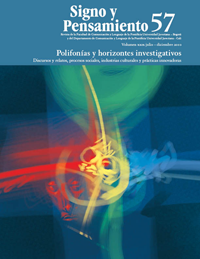Abstract
In this article we try to establish a relationship between social tradition and the expansion of the culture of literacy plus the development of capitalism, via the correspondences found in the countries members of the Group of Seven, i.e. the most “developed” in fields such as educational achievements, knowledge production, and industry and high technology exports. These correspondences are stronger in the Anglo- Saxon countries and Japan, and they might explain why globalization is an Anglo-Saxon phenomenon; why these countries lie at the heart of the capitalist world-system, and why “development” is impossible for countries in the periphery.
Boyer, R. (1992), Teoría de la regulación, Valencia, Edicions Alfons El Magnanim.
Castells, M. (1999), La era de la información, vol. iii, México, Siglo xxi.
Crystal, D. (1997), The Cambridge Encyclopedia of Language, 2.a ed., Nueva York, Cambridge University Press.
Gordon Childe, V. (1997), Los orígenes de la civilización, Bogotá, fce.
HDR. (2006), Human Development Report [en línea], disponible en: http://hdr.undp.org/ en/media/HDR06-complete.pdf, recuperado: noviembre de 2009.
Herrera, B. (2005), Globalización. El proceso real y financiero, Bogotá, Universidad Nacional de Colombia.
Huntington, S. (2001), El choque de civilizaciones, Barcelona, Paidós.
Llinás, R. (1998), “Ciencia, educación y desarrollo: Colombia en el siglo xxi”, en Colombia: al filo de la oportunidad, Bogotá, Colciencias, Tercer Mundo Editores.
Montenegro, S. (2009, 29 de octubre), “El mundo nos está dejando atrás”, en El Espectador.
Ortiz, R. (2009), La supremacía del inglés en las ciencias sociales, Buenos Aires, Siglo xxi.
Petrucci, A. (1999), Alfabetismo, escritura y sociedad, Barcelona, Gedisa.
PNUD (2006), Informe sobre desarrollo humano [en línea], disponible en: http://hdr.undp.org/ en/media/HDR_2009_ES_Complete.pdf, recuperado: noviembre de 2009.
Rey, G. (2009), “Las reubicaciones de la lectura. Libros, lectores y lecturas”, en Pensamiento Iberoamericano, núm. 4, 2.ª época, AECID, Fundación Carolina, pp. 235-253.
Robinson, W. (2007), Una teoría sobre el capitalismo global, Bogotá, Desde Abajo.
Sarmiento A., L. (2004), Sistema mundo capitalista. Fábrica de riqueza y miseria, Bogotá, Desde Abajo.
— (2009a, octubre), “Educación: entre la ilusión y la incertidumbre”, en Le Monde Diplomatique [Edición Colombia], pp. 4-7.
— (2009b, diciembre), “Economía política del presupuesto general de la nación”, en Le Monde Diplomatique, pp. 4-5.
Schiller, D. (2009, diciembre), “Los gigantes de la pos-crisis”, en Le Monde Diplomatique, pp. 32-33.
Sierra Caballero, F. (2006), Políticas de comunicación y educación. Crítica y desarrollo de la sociedad del conocimiento, Barcelona, Gedisa.
Sousa Santos, B. de (2002, julio), “Hacia una concepción multicultural de los derechos humanos”, en El otro derecho. Otras miradas sobre la justicia, núm. 28.
PNUD (Programa de las Naciones Unidas para el Desarrollo) (2006), Human Development Report 2006 [en línea], pnud, disponible en http://hdr.undp.org/en/media/HDR06- complete.pdf, recuperado: noviembre de 2009.
Wallerstein, I. (2007), La crisis estructural del capitalismo, Bogotá, Desde Abajo.
— (1979), El moderno sistema mundial (I). La agricultura capitalista y los orígenes de la economía-mundo europea en el siglo xvi, Madrid, Siglo XXI.
This journal is registered under a Creative Commons Attribution 4.0 International Public License. Thus, this work may be reproduced, distributed, and publicly shared in digital format, as long as the names of the authors and Pontificia Universidad Javeriana are acknowledged. Others are allowed to quote, adapt, transform, auto-archive, republish, and create based on this material, for any purpose (even commercial ones), provided the authorship is duly acknowledged, a link to the original work is provided, and it is specified if changes have been made. Pontificia Universidad Javeriana does not hold the rights of published works and the authors are solely responsible for the contents of their works; they keep the moral, intellectual, privacy, and publicity rights.
Approving the intervention of the work (review, copy-editing, translation, layout) and the following outreach, are granted through an use license and not through an assignment of rights. This means the journal and Pontificia Universidad Javeriana cannot be held responsible for any ethical malpractice by the authors. As a consequence of the protection granted by the use license, the journal is not required to publish recantations or modify information already published, unless the errata stems from the editorial management process. Publishing contents in this journal does not generate royalties for contributors.


